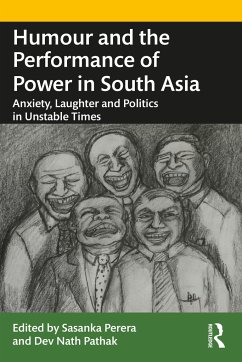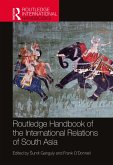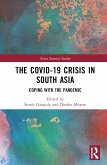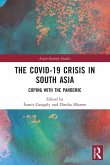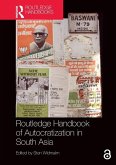This book critically examines the role and politics of humour and the performance of power in South Asia. What does humour do and how does it manifest when lived political circumstances experience ruptures or instability? Can humour that emerges in such circumstances be viewed as a specific narrative on the nature of democracy in the region? Drawing upon essays from India, Sri Lanka and Bangladesh, this volume discusses many crucial historical and contemporary themes, including dance-drama performances in northern India; caste and stand-up comedy in India; cartoon narratives of citizens' anxieties; civic participation through social media memes in Sri Lanka; media, politics and humorous public in Bangladesh; the politics of performance in India; and the influence of humour and satire as political commentaries. The volume explores the impact of humour in South Asian folklore, ritual performances, media and journalism, and online technologies.
This topical and interdisciplinary book will be essential for scholars and researchers of cultural studies, political science, sociology and social anthropology, media and communication studies, theatre and performance studies, and South Asian studies.
This topical and interdisciplinary book will be essential for scholars and researchers of cultural studies, political science, sociology and social anthropology, media and communication studies, theatre and performance studies, and South Asian studies.
'Perera and Pathak weave together a number of 'serious' perspectives on humour. Inaugurating a novel method to excavate the nuances of cultural politics in South Asia, the book offers useful insights that both refine and deepen scholarship in South Asian studies. Edited by two prominent South Asianists, this book will profit all social scientists who are willing to undertake serious adventures beyond the predictable, formulaic and mainstream approaches. It is profoundly engrossing and enriching - a must read!'
Ashok Acharya, Professor, Department of political science, University of Delhi, India
'Humour expands the field of politics at innocent moments, but to dissect the codes of subversive energy inherent in humour is extremely challenging. A pioneering effort at south Asian scale, here, the subversive politics, the hidden layers of the embedded past of the region and the cultural nuances of humour all come alive brilliantly. From Punch to stand-up comedy, and from Khattar Kaka's philosophical forays to internet memes, the book offers an extraordinary canvas of humour and its subversive energy in South Asia.'
Sadan Jha, Associate Professor, Centre for Social Studies, Surat, Gujarat, India
'In complete seriousness, this amazing work examines humour in social and political relations in diverse contexts! What makes the book different and iconic in some senses is the unravelling of laughter and humour in classical frames of analysis. It opens a new mode of understanding social reality: a lens which is often ignored because it is considered trivial or merely funny. By taking it seriously, anthropologists Perera and Pathak have opened up novel avenues for research in our efforts to unpack a troubled world disrupted by political instability, violence, anxiety, trauma, and much else.'
Meenakshi Thapan, Former Professor of Sociology and Director, Delhi School of Economics, University of Delhi, India
Ashok Acharya, Professor, Department of political science, University of Delhi, India
'Humour expands the field of politics at innocent moments, but to dissect the codes of subversive energy inherent in humour is extremely challenging. A pioneering effort at south Asian scale, here, the subversive politics, the hidden layers of the embedded past of the region and the cultural nuances of humour all come alive brilliantly. From Punch to stand-up comedy, and from Khattar Kaka's philosophical forays to internet memes, the book offers an extraordinary canvas of humour and its subversive energy in South Asia.'
Sadan Jha, Associate Professor, Centre for Social Studies, Surat, Gujarat, India
'In complete seriousness, this amazing work examines humour in social and political relations in diverse contexts! What makes the book different and iconic in some senses is the unravelling of laughter and humour in classical frames of analysis. It opens a new mode of understanding social reality: a lens which is often ignored because it is considered trivial or merely funny. By taking it seriously, anthropologists Perera and Pathak have opened up novel avenues for research in our efforts to unpack a troubled world disrupted by political instability, violence, anxiety, trauma, and much else.'
Meenakshi Thapan, Former Professor of Sociology and Director, Delhi School of Economics, University of Delhi, India

